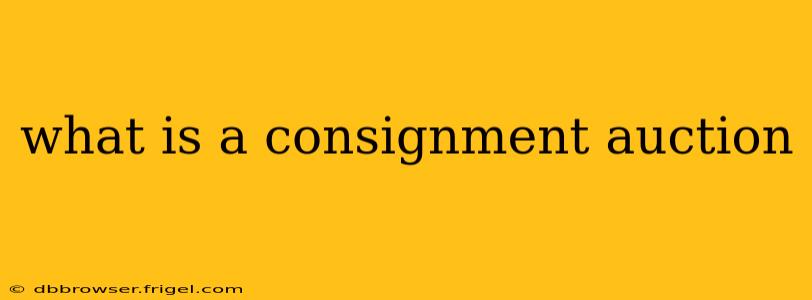A consignment auction is a type of auction where a seller (the consignor) entrusts their goods to an auction house or auctioneer to sell on their behalf. Instead of the auction house owning the items, they act as an intermediary, marketing and selling the goods and then remitting the proceeds (less their commission and any other agreed-upon fees) to the consignor. Think of it as a commission-based sales arrangement, but with the high-energy and competitive bidding environment of a public auction.
This differs significantly from an auction where the auction house owns the items being sold. In a consignment auction, the consignor retains ownership until the item sells.
How Does a Consignment Auction Work?
The process generally unfolds as follows:
-
Consignment Agreement: The consignor and the auction house enter into a written agreement outlining the terms of the sale, including the items to be sold, the reserve price (the minimum acceptable bid), the commission rate, and the payment schedule. This agreement protects both parties and clarifies expectations.
-
Appraisal and Cataloguing: The auction house appraises the items to determine their estimated value. This valuation helps establish a reasonable reserve price and assists in marketing the items effectively. The items are then catalogued, photographed, and described for the auction catalogue and online listings. High-quality photos and detailed descriptions are crucial for attracting bidders.
-
Marketing and Promotion: The auction house uses various marketing channels to promote the sale, including online listings, print advertisements, email marketing, and social media. The goal is to generate interest and attract potential buyers.
-
Auction Day: The auction takes place, either live in a physical location or online. Bidders compete to purchase the items, and the highest bidder wins.
-
Payment and Remittance: Once the auction is complete, the auction house processes the payments from the winning bidders. After deducting their commission and other agreed-upon expenses, they remit the remaining proceeds to the consignor.
What are the Advantages of Using a Consignment Auction?
-
Wider Reach: Auction houses often have extensive networks of buyers, both locally and internationally, potentially leading to a higher sale price than through other selling methods.
-
Faster Sale: Auctions can sell items quickly, often within a few weeks of consignment.
-
Expertise and Marketing: Auction houses provide expertise in appraisal, marketing, and sales, which can save the consignor time and effort.
-
Transparency: The bidding process is transparent, allowing the consignor to see exactly how much their items sold for.
-
Reduced Risk: The auction house handles the logistics of the sale, including payment collection and buyer communication, reducing the risk of non-payment or disputes for the consignor.
What are the Disadvantages of Using a Consignment Auction?
-
Commission Fees: Auction houses charge a commission on the sale price, which can be a significant expense.
-
Reserve Prices: Setting a reserve price can prevent an item from selling if it doesn't meet the minimum.
-
Auction Timing: The timing of the auction might not be ideal for the consignor's needs.
-
Lack of Control: The consignor relinquishes some control over the sale process.
-
Potential for Unsold Items: There's always a chance that an item won't sell if it doesn't attract enough bids.
What Types of Items are Often Sold Through Consignment Auctions?
A wide variety of items can be sold through consignment auctions, including:
-
Antiques and Collectibles: Furniture, artwork, porcelain, jewelry, and other valuable collectibles are commonly sold through consignment auctions.
-
Fine Art: Paintings, sculptures, and prints from renowned artists are often auctioned off through this method.
-
Real Estate: While less common than other items, real estate can also be sold through consignment auctions.
-
Vehicles: Classic cars, motorcycles, and boats are frequently sold at consignment auctions.
How Do I Find a Reputable Consignment Auction House?
Research is key. Look for auction houses with a strong reputation, experience in handling similar items, transparent fee structures, and positive customer reviews. Check their online presence and speak to other consignors for feedback before entrusting your items.
This comprehensive guide provides a solid understanding of consignment auctions, their benefits and drawbacks, and how to navigate this process successfully. Remember to always read the consignment agreement carefully before committing to a sale.
